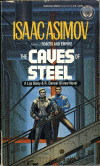When I was looking for what to spend some of my first Audible credits on, The Martian by Andy Weir stood out. This still ranks at the top of roughly 15 audiobooks I’ve listened to for two reasons. First, the story and writing was engaging. This was “hardest” sci-fi I’ve read so far. There is a lot of math, chemistry, physics, and botany (yes botany). I’m sure that many people would be put off by such dry and detailed descriptions, but that leads me to my second point. The performance of the narrator, R.C. Bray, was superb. He made the “hard science” interesting and entertaining. His voice strikes me as a perfect fit for the main character, Mark Watney. Do yourself a favor and listen to the 5 minute sample on Audible and judge for yourself. While the book focuses on his Watney’s mission log, R.C. Bray does voices for other characters in NASA back on Earth. The voices are OK, nothing but nothing spectacular. I can’t say there is anything wrong, but there are other narrators with a stronger skill for differing character voices.
The book starts off with Watney starting the mission log. He basically got left for dead on Mars during an evacuation of the Ares 3 mission. He doesn’t really have much hope of surviving long term, but hopes someone will find the log after he dies to uncover his story. As the book progresses, the log entries pile up and eventually we start to see some plot progression from NASA back on Earth. I ended up really liking the log entry format because it fit in with my relatively short commute. I generally was able to get through a couple entries in just about 15 minutes or so. I really can’t go into the plot much without revealing a bunch of spoilers. All I can say is if you like Science Fiction, this is a must read/listen. This actually won the Audie Award (think Oscars for audiobooks) for the Science Fiction category. R.C. Bray also got the award for best Solo Narration – Male. Do yourself a favor and try to get this on audio. I managed to twist a friend’s arm to get this on audio back when the sale (long gone) was for the $1.99 Kindle Edition with $2.99 audio upgrade.
I thought really hard after finishing this book whether or not I’d want to actually read it sometime in the future. I eventually decided that I just couldn’t, because I would miss R.C. Bray’s voice. If you’ve never listened to an audiobook, give it a try. Groupon has a current deal for new Audible.com members: $1.95 a month for the first 3 months. Three audiobooks for $6 is a major bargain in my opinion. If you’d like to support my site, click through my link, which I may or may not get referral credit for: Audible deals at Groupon
I can’t wait to see the movie adaptation that is due out on Friday. I’m sure just about everyone has heard about it, especially since the recent announcement from the real NASA that they have evidence of actual surface water on Mars. I’m hoping that that publicity and this book / movie will help get enough attention so we can actually make things like the Ares mission actually happen. Sometimes I wish we could easily erase our memories of books before seeing the movie, then restore it later to compare. After I see the movie, I’ll review that as well. Andy Weir really deserves all he’s going to get from the book, audiobook, and movie rights. He really did find a winning formula for great Science Fiction.


